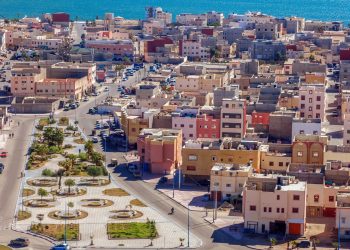In his report to the Security Council on the Moroccan Sahara, which has just been officially published on the United Nations’ website, UN Chief Antonio Guterres dedicated a significant part of the document to the visit paid by his Personal Envoy Staffan de Mistura to Laâyoune and Dakhla, in the Saharan provinces of the Kingdom, on September 5-7.
The UN Secretary General highlighted the Personal Envoy’s talks with local elected officials, dignitaries and sheikhs of the Sahrawi tribes, who expressed their unwavering attachment to the Moroccanness of the Sahara as well as their support for the Moroccan autonomy initiative, within the framework of the Kingdom’s national sovereignty and territorial integrity.
These meetings with local elected officials allowed the Personal Envoy to appreciate local democracy in the southern provinces, where the population elects, by universal suffrage and with a turnout rate that exceeds the national average, its representatives both at the national Parliament as well as regional and municipal authorities.
The visit of the Personal Envoy, says the report of the UN Secretary General, was also an opportunity to inquire about the continued development experienced by the southern provinces since their return to the homeland.
The Personal Envoy, who was traveling without any particular security measures, witnessed first-hand the tranquility that prevails in these provinces, and the important infrastructures that have been built to promote the economic, social, cultural and environmental development of the Moroccan Sahara.
The Secretary General’s report mentions, in this regard, the structuring projects financed and implemented by the Kingdom, such as the Tiznit-Dakhla highway and the Dakhla Atlantic port, which aims to be, once completed, one of the largest in Africa, and to allow the southern provinces to be a regional hub for investment, logistics and international trade, particularly with the African continent.
The documents also mentions the visit of the Personal Envoy to hospitals, vocational training centers and sports establishments. So many structures which show an accelerated development dynamic and which have benefited, in recent years, under the leadership of His Majesty King Mohammed VI, within the framework of the New development model for the southern provinces, from financing exceeding 10 billion dollars.
Mr. Guterres referred to the Royal Speech on the occasion of the 47th anniversary of the Green March, in which the Sovereign stressed that the Tiznit-Dakhla highway is already in its final stages and that the construction of the major Dakhla Atlantic port will begin soon.
The Secretary-General’s Report, presented to the Security Council, also refers to the Personal Envoy’s meetings with local civil society players active in the areas of human rights, sustainable development, and the empowerment of women and youth.
These exchanges allowed the Personal Envoy to take note of the dynamism of civil society and its involvement in the management of public affairs, within the framework of a participatory democracy which is a tangible reality in the governance of the southern provinces as the other regions of the Kingdom.
These meetings are also the result of the climate of democracy and respect for human rights which prevails in the southern provinces, far from the fallacious allegations of Algeria. Moreover, the Secretary General’s report relates the meeting between Mr. de Mistura and the presidents of the regional commissions of the National Human Rights Council in Laâyoune and Dakhla, who gave him exhaustive presentations on progress in the area of promotion and protection of human rights in the southern provinces.
MAP: 15 October 2023








